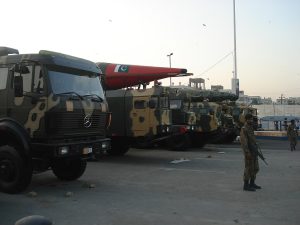In a surprising development earlier this week, the United States imposed sanctions on Pakistan’s state-run missile development agency and three domestically based private vendors. This unprecedented action marks a significant departure from Washington’s previous stance regarding Pakistan’s missile program, highlighting a shift in both policy and rhetoric.
This is the first instance in recent history where the U.S. has openly sanctioned a state-owned military conglomerate. Furthermore, it indicates an alarming change in the discourse surrounding Pakistan’s nuclear capabilities.
Senior U.S. officials have expressed concerns that Islamabad’s long-range ballistic missile program could enable it to target regions beyond South Asia. Notably, Deputy National Security Adviser Jon Finer made an unsettling assertion that this capability might extend even to potential targets within the United States itself. “Candidly, it is hard for us to see Pakistan’s actions as anything other than an emerging threat to the United States,” Finer stated, emphasizing that Islamabad’s conduct raises “real questions.”
In light of these developments, Principal Deputy Spokesperson Vedant Patel reinforced Washington’s position during a press briefing with reporters, reiterating that it has been longstanding U.S. policy to deny support for Pakistan’s long-range ballistic missile endeavors.
Pakistan’s response to these unexpected sanctions has been calculated yet resolute.
The country characterized the U.S.-imposed sanctions on its national conglomerate and three commercial entities as “unfortunate and biased.” The Foreign Office (FO) issued a statement asserting that such measures contradict efforts toward peace and security by exacerbating military asymmetries within the region.
The FO further articulated concerns regarding strategic stability, stating: “Such policies have dangerous implications for strategic stability of our region and beyond.”
Additionally, they lamented the imposition of sanctions on private commercial entities, contending that previous listings were often based on mere suspicion without substantial evidence. The FO also pointed out inconsistencies in nonproliferation norms when advanced military technology licensing requirements have been relaxed for other nations in past instances.
The recent imposition of sanctions by the United States on Pakistan has raised significant concerns among Pakistani leaders, who perceive this action as indicative of a “double standard” in U.S. foreign policy.
This sentiment is further exacerbated by the growing defense partnership between Washington and India, which includes advanced missile systems and high-end technology transfers that have substantially enhanced India’s military capabilities. Such developments are viewed as creating a strategic imbalance within the South Asian region.
According to the Pakistani English daily Dawn News, diplomatic sources in Washington have suggested that the rhetoric surrounding Pakistan’s ballistic missile program may be an effort to exert pressure on Islamabad, potentially at the behest of New Delhi. For many in Pakistan, these newly announced curbs — just ahead of Donald Trump’s inauguration in January 2025 — signal a troubling shift that could strain bilateral relations and redirect attention toward Pakistan’s missile initiatives.
Analysts caution that the incoming administration in Washington may intensify scrutiny over Pakistan’s long-range ballistic missile program, building upon sanctions imposed by outgoing President Joe Biden. Trump’s administration seemingly appears poised to adopt a more aggressive stance toward Pakistan-U.S. military cooperation, particularly given his key advisers’ advocacy for enhanced military collaboration with India.
However, experts argue that these sanctions reflect a narrow understanding of Pakistan’s strategic imperatives. Rabia Akhtar, a visiting scholar at Harvard Kennedy School’s Managing the Atom project, asserted that targeting specific entities within Pakistan’s missile development framework overlooks its indigenous capabilities. She emphasized that this self-sustained program operates independently of external influences and is not easily swayed by coercive tactics.
Moreover, Akhtar contended that such measures fail to address broader regional security dynamics while neglecting the provocations that drive Pakistan’s deterrence posture.
The risk associated with these sanctions lies in their potential to alienate Islamabad without achieving their intended outcomes, Akhtar warned. This underscores an urgent need for more balanced and nuanced policies that acknowledge the complexities inherent in South Asia’s geopolitical landscape, she argued.
The situation not only underscores shifting geopolitical dynamics but also raises critical questions about regional security frameworks moving forward.

































